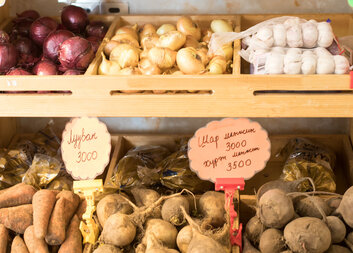Due to the food and beverage sector’s heavy environmental impact, adopting resource-efficient practices from Farm to Fork Strategy, in line with the European Union’s Green Deal, is key to success in Mongolia’s quest to transition to a low-carbon circular economy and accelerate poverty reduction. Therefore, the “Switching On the Green Economy” project is being implemented.
The “Switching On the Green Economy” is the first SWITCH-Asia project in the Agri-Food and Beverage Sector to be implemented in Mongolia. In line with the government of Mongolia’s national strategy to cut greenhouse gas emissions by 22.7% by 2030, the project aims to support agri-food and beverage MSMEs, agri-food and beverage business associations (BA), and retailers in adopting circular economy practices through a market-based eco-labeling system, capacity building, behavior change, and access to green finance. The Switching On the Green Economy project is designed and implemented by People in Need (PIN), the Mongolian Sustainable Finance Association, Development Solutions NGO, and Caritas Czech Republic INGO.
The overall objective of the project is to contribute to progressive transition to low-carbon, resource-efficient circular economy and accelerated poverty reduction in Mongolia
The specific objective of the project is to support the Agri-Food and Beverage MSMEs, and retailers in adopting circular economy practices through a market-based eco-labelling system, capacity building, behavior change, and access to green finance.
Total budget: EUR 2.200.000 (EU Contribution 80%)
Project duration: January 2022 – December 2025
Target areas: Ulaanbaatar, Erdenet and Selenge province
Main areas of focus and some of the key activities:
1. Develop eco-labelling standards and policy framework to introduce into the agri-food and beverage sector.
- Compile a formative research on the existing eco-labelling schemes in order to prepare the groundwork for the update of the eco-labelling standards and policy in Mongolia.
- Inform key state stakeholders on the benefits of eco-labelling through high-level national consultations; Submit policy recommendations to better facilitate eco-labelling schemes for target groups.
- Develop two sets of standards and Standard Operating Procedures (SOPs) - 1 for eco-retailers/MSMEs and another one for eco-products. Facilitate comprehensive guidance on eco-labelling standards and SOPs.
2. Agri-food and beverage sector MSMEs and retailers adopt eco-labelling for their products and are equipped with the know-how to introduce circular economy and green value chain practices.
- Conduct an in-depth assessment on the current level of understanding and capacities on eco-labelling and circular economy practices (energy, water and resource efficiency practices, use of transport, use of packaging, food waste, etc.)
- Develop a curriculum and training manuals reflecting environmental and green business topics based on eco-labeling standards.
- Provide technical assistance for 1,500 MSMEs and 300 retailers and direct mentorships for 450 MSMEs and 150 retailers.
- Provide one-on-one tailored consultations for 20 MSMEs; Disseminate case studies on MSMEs’ process of obtaining eco-labels.
- Support 10 MSMEs in accessing green finance;
- Organize 1 study visit to the EU and 3 knowledge-exchange visits in Mongolia.
3. New online certification platform is in place to facilitate green certification of MSMEs and retailers;
- Conduct a feasibility study on existing green certification platforms.
- Develop a new online green certification platform with a corresponding business plan
- Select and train 60-70 circular business verifiers; invite successful candidates to joinMSFA’s eco-labelling team
- Launch eco-labeling online platform and report pilot scores 20 MSMEs/retailers.
4. Eco-labelling integrated with the existing digital payment products and scaled-up;
- Integrate green labelling guidelines for financial institutions and loyalty platforms with eco-labelling SOPs. Integrate green labelling functions to existing payment platforms.
- Develop a monitoring, evaluation and reporting template to track and report on green transactions.
- Organize promotion events and materials including two public events and one multi-media package highlighting the events.
5. The use of eco-labelling and green certification is promoted through a behavior change campaign.
- Conduct and publish a Social Behavior Change study to investigate consumers’ preferences in terms of eco-labels and the factors that would encourage them in purchasing such green products; and MSMEs’ and retailers’ main barriers and enablers preventing or promoting the integration of environmental standards in the production stages and introduction of eco-labels.
- Organize large-scale behavior change campaign and raise awareness to promote green certification and eco-labelling.
End goals:
- Less environmentally polluted environment for communities at large
- Improve business opportunities stemming from transitioning towards a greener economy
- Greater choice of green products for consumers
- Greater awareness of social benefits stemming from clean production
- MSMEs/Retailers in other sector can benefit and replicate lessons learnt on eco-labelling and circular economy practices from the food and beverage industry
- Greater diversity of supporting services in the green industry.





